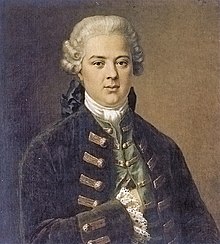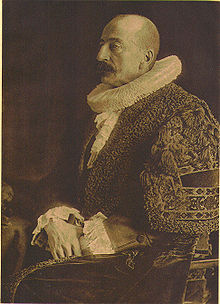Hanseaten (class)

The Hanseaten (German:
Since the
Hamburg was one of the oldest stringent civic republics,
The Hanseaten were regarded as being of equal rank to the (landed)
Relationship to the nobility
| History of Hamburg |
|---|
 |
| by timeline |
| by other topic |
|

The relationship between the Hanseatic and noble families varied depending on the city. The most republican city was Hamburg, where the nobility was banned, from the 13th century to the 19th century, from owning property, participating in the political life of the city republic, and even from living within its walls. Hamburg, however, was not a true democracy, but rather an
Hanseatic rejection
The long standing tradition that Hanseaten do not accept medals and honors "of foreign powers" is called the "hanseatic rejection". It is reflecting the spirit of unconditional independence, modesty and equality of the citizens of hanseatic cities. In an early version of the Hamburg constitution from 1270 it is written that "the fact that the externally visible insignia of the order should distinguish the decorated one from his colleagues and fellow citizens as a superior one" as a circumstance that was in decisive contradiction to the spirit of the city constitution.[10] Politician Hans Koschnik (Bremen), former chancelor Helmut Schmidt (Hamburg) and several others people from Lübeck, Hamburg and Bremen refused the Order of the Federal Cross of Merit referring to the "hanseatic rejection".[11][12]
Bremen and Hamburg are also the only federal states that have not created their own orders of merit.
Hanseatic families
A few prominent families are listed here.
Abendroth
- Amandus Augustus Abendroth (1767–1842), mayor of Hamburg
- August Abendroth (1796–1876), lawyer
- Carl Eduard Abenroth (1804–1885), merchant, member of the Hamburg parliament
Albers
- Johann Christoph Albers (1741–1800), merchant representative of Bremen
- Johann Heinrich Albers (1775–1800), merchant of Bremen/London, art collector
- Anton Albers der Ältere (1765–1844), merchant of Bremen/Lausanne, painter
Amsinck
- Rudolf Amsinck (1577–1636), senator of Hamburg
- Wilhelm Amsinck (1752–1831), mayor of Hamburg
Berenberg, Goßler and Berenberg-Goßler
- Johann Hinrich Gossler (1738–1790), banker
- Johann Heinrich Gossler (1775–1842), senator and banker
- Anna Henriette Gossler (1771–1836), married to Ludwig Edwin Seyler
- Hermann Goßler(1802–1877), senator and First Mayor of Hamburg
- John von Berenberg-Gossler (1866–1943), Hamburg senator and banker
- Oskar Goßler(1875–1953), German sculler
- Gustav Goßler (1879–1940), German sculler
Burchard
- Johann Heinrich Burchard (1852–1912), mayor of Hamburg
- Johannes Leopold Burchard (1857–1925), Hamburg lawyer
- Wilhelm Amsinck Burchard-Motz (1878–1963), mayor of Hamburg
de Chapeaurouge
- Frédéric de Chapeaurouge (1813–1867), senator of Hamburg
- Charles Ami de Chapeaurouge (1830–1897), senator of Hamburg
- Paul de Chapeaurouge (1876–1952), senator of Hamburg
- Alfred de Chapeaurouge (1907–1993), German politician
Fehling
- Hermann von Fehling (1812–1885), German chemist
- Johann Fehling (1835–1893), Lübeck senator
- Emil Ferdinand Fehling (1847–1927), mayor of Lübeck, "Dr. Moritz Hagenström" in Buddenbrooks
Godeffroy
- Johann Cesar VI. Godeffroy (1813–1885), Hamburg merchant
Hudtwalcker
- Johann Michael Hudtwalcker (1747–1818), Hamburg merchant
- Martin Hieronymus Hudtwalcker (1787–1865) Hamburg senator
- Nicolaus Hudtwalcker (1794–1863), Hamburg insurance broker
Jauch
- Johann Christian Jauch senior (1765–1855), Hamburg merchant and Grand Burgher
- Auguste Jauch (1822–1902), Hamburg benefactor to the poor
- Carl Jauch (1828–1888), Grand Burgher, Lord of Wellingsbüttel and cavalry lieutenant in the Hamburg Citizen Militia
- August Jauch (1861–1930), delegate of the grand burghers (Notabelnabgeordneter) to the Hamburg parliament
- Hans Jauch (1883–1985), German colonel and Freikorps-leader
- Walter Jauch (1888–1976), founder of Aon Jauch & Hübener
- Günther Jauch (born 1956), German television host and producer
Jencquel
This section is empty. You can help by adding to it. (January 2011) |
Justus
- Bartholomäus Justus (1540–1607), Hamburg notary public at St Petri district of Hamburg
- Christoph Justus (1579–1652), Merchant in the Gröninger Straße, St Katharinen district of Hamburg
- Friederich Justus (1683–1757), Merchant in Neukalen and Mayor of Neukalen in the state of Mecklenburg, Founder of the Tobacco business est in 1723
- Friederich Justus (1722–1784), Merchant and Tobacco Manufacturer in the Gröninger Straße, Grand Burgher, Oberalter St Katharinen, top 5 ranking member of the Hamburg Parliament, President of the Hamburg Chamber of Commerce
- Joachim Christian Justus (1732–1802), Merchant and Tobacco Manufacturer in Hamburg and in Riga
- Georg Heinrich Justus (1761–1803), Merchant and Tobacco Manufacturer in the Gröninger Straße
- Friederich Justus (1797–1852), Merchant and Tobacco Manufacturer in the Gröninger Straße, Consul General of the Grand Duchy of Tuscany in Hamburg
- Heinrich Wilhelm Justus (1800–1839), Merchant and Tobacco Manufacturer in the Gröninger Straße
- Heinrich Eduard Justus (1828–1899), Owner of the first united steam shipping fleet on the Alster and the dockyard at Leinpfad Hamburg, Member of Hamburg Parliament
- Johannes Wilheln Justus (1857–1943), Partner of the Latin America Trading Company "Riensch & Held" est 1845 in Hamburg and Mexico, Co-Founding Member of the Hamburg Golf Club in 1905
- Heinz Heinrich Ernst Justus (1894–1982), Partner of the Latin America Trading Company "Riensch & Held", member of the plenum of Hamburg Chamber of Commerce, First Lieutenant WWI, EK I and EK II
Kellinghusen
- Heinrich Kellinghusen (1796–1879), Hamburg merchant and first mayor
Lorenz-Meyer
This section is empty. You can help by adding to it. (January 2011) |
Mann
- Thomas Johann Heinrich Mann (1840–1891), senator of Lübeck; fictionalized "Thomas Buddenbrook" in Buddenbrooks
- Heinrich Mann (1871–1950), German novelist
- Thomas Mann (1875–1955), German novelist
- Erika Mann (1905–1969), German actress and writer
- Klaus Mann (1906–1949), German novelist
- Golo Mann (1909–1994), German historian
Merck (Hamburg branch of the Merck family)
- Heinrich Johann Merck (1770–1853), Hamburg senator
- Syndicus(privy councillor)
- Baron Ernst Merck (1811–1863), Hamburg merchant and cavalry chief of the Hamburg Citizen Militia
Moller (vom Baum)
- Barthold (Bartholomeus) Moller (1605–1667), mayor of Hamburg
Mutzenbecher
- Matthias Mutzenbecher (1653–1735), senator of Hamburg
- Johann Baptista Mutzenbecher (1691–1759), privy councillor (Senatssyndicus) of Hamburg
Nölting
This section is empty. You can help by adding to it. (January 2011) |

mayor of the Free Imperial and Hanseatic City of Lübeck, son of Eleonora Maria Jauch (drawing by Johann Friedrich Overbeck)
Overbeck
- Johann Daniel Overbeck (1715–1802), theologian and dean of the Katharineum
- Christian Adolph Overbeck (1755–1821), mayor of Lübeck, novelist
- Christian Gerhard Overbeck (1784–1846), judge at the High Court of Appeal of the four free cities
- Johann Friedrich Overbeck (1789–1869), German painter, head of the Nazarene movement
- Christian Theodor Overbeck (1818–1880), senator of Lübeck
- Johannes Overbeck (1826–1895), German archaeologist
Petersen
- Carl Friedrich Petersen (1809–1892), mayor of Hamburg
- Carl Wilhelm Petersen (1868–1933), mayor of Hamburg
- Rudolf Petersen (1878–1962), mayor of Hamburg
Schlüter
This section is empty. You can help by adding to it. (January 2011) |
Schröder
- Christian Matthias Schröder (1742–1821), mayor of Hamburg
- Christian Mathias Schröder (1778–1860), Hamburg senator
- Johann Heinrich Schröder (Freiherr John Henry Schröder) (1784–1883), Baron, Hamburg banker
- Carl August Schröder (1821–1902), Hamburg judge and member of parliament
- Carl August Schröder (1855–1945), mayor of Hamburg
Schuback
- Nicolaus Schuback (1700–1783), mayor of Hamburg
Siemers
- Edmund Siemers (1840–1918), Hamburg ship-owner
- Kurt Siemers (1873–1944), Hamburg ship-owner and banker
- Kurt Hartwig Siemers (1907–1988), Hamburg banker
Sieveking
- Georg Heinrich Sieveking (1751–1791), Hamburg merchant
- Sir Edward Henry Sieveking (1816–1904), physician
- Kurt Sieveking (1897–1986), mayor of Hamburg
Sillem
- Garlieb Sillem (1717–1732), mayor of Hamburg
Sloman
- Robert Miles Sloman (1783–1867), Hamburg ship-owner
- Henry Brarens Sloman (1848–1931), Hamburg ship-owner
Stern
Tesdorpf
- Peter Hinrich Tesdorpf (1648–1723), mayor of Lübeck
- Peter Hinrich Tesdorpf (1751–1832), mayor of Lübeck
- Johann Matthaeus Tesdorpf (1749–1824), mayor of Lübeck
- Adolph Tesdorpf (1811–1887), Hamburg senator
- watercolourist
See also
- List of mayors of Hamburg – Hanseatics being those since approximately 1650, Hanseatic families are normally those of the mayors until 1918.
- Elbchaussee – Residential avenue in Hamburg, emblematic of a Hanseatic lifestyle.
- Patrician (post-Roman Europe)
- Aristocracy (class)
- Gentry
- Burgess (title)
- Bourgeoisie
- Bourgeois of Brussels
- Bildungsbürgertum
Literature
- Lu Seegers (2016): Hanseaten: Mythos und Realität des ehrbaren Kaufmanns seit dem 19. Jahrhundert. (Hanseatic class: myth and reality of the honorable merchant since the 19th century). in: Katalog des Europäischen Hansemuseums, Lübeck 2016, p. 106-110.
- Lu Seegers (2014): Hanseaten und das Hanseatische in Diktatur und Demokratie: Politisch-ideologische Zuschreibungen und Praxen (Hanseatic League and the Hanseatic in Dictatorship and Democracy: Political-Ideological Attributions and Practices). in: Zeitgeschichte in Hamburg 2014, hrsg. von der Forschungsstelle für Zeitgeschichte in Hamburg (FZH), Hamburg 2015, p. 71-83.
References
- ISBN 3-86108-693-X
- ^ Following the Greater Hamburg Act, it was named the Hanseatic City of Hamburg (Hansestadt Hamburg) from 1938 until 1952 (constitution of 6 June 1952 Archived 18 June 2007 at the Wayback Machine), at which point it again became known as the Free and Hanseatic City of Hamburg (Freie und Hansestadt Hamburg)
- Federal Constitutional Court of Germany in its attempt to reconstitute its statehood
- ^ Nobles were banned since 1276 from living inside the city wall – Renate Hauschild-Thiessen, Adel und Bürgertum in Hamburg, in: Hamburgisches Geschlechterbuch, volume 14, Limburg an der Lahn 1997, p. XXII
- ^ The historical science assumes a timocratic or oligarchic character of Hamburg's constitution, being the reason why Hamburg at the Congress of Vienna was accepted by the princes of the German states as a member of the German Confederation – Peter Borowsky, Vertritt die "Bürgerschaft“ die Bürgerschaft? Verfassungs-, Bürger- und Wahlrecht in Hamburg von 1814 bis 1914, in: Schlaglichter historischer Forschung. Studien zur deutschen Geschichte im 19. und 20. Jahrhundert, Hamburg, p. 93)
- ^ Rudolf Endres. "Adel in der frühen Neuzeit". Enzyklopaedie Deutscher Geschichte. Vol. 18. Oldenbourg. p. 72.
- ^ Richard J. Evans (1987). Death in Hamburg: Society and Politics in the Cholera Years 1830–1910. Oxford. p. 560.
{{cite book}}: CS1 maint: location missing publisher (link) - ^ a b c Renate Hauschild-Thiessen (1997). "Adel und Bürgertum in Hamburg". Hamburgisches Geschlechterbuch. Vol. 14. p. 30.
- ^ Percy Ernst Schramm (1969). Gewinn und Verlust. Hamburg: Christians. p. 108.
- ^ German Original: "die Tatsache, dass die äußerlich sichtbaren Ordensinsignien den Decorierten vor seinen Kollegen und Mitbürgern als einen vorzüglicheren auszeichnen sollen". Manager Magazin, 2002 https://www.manager-magazin.de/unternehmen/karriere/a-205859.html
- ^ "Warum Hanseaten keine Orden tragen". shmh.de (in German). Retrieved 20 April 2022.
- ^ Döbler, Moritz (21 April 2016). "Ein großer Bremer, ein großer Staatsmann - WESER-KURIER". weser-kurier-de (in German). Retrieved 20 April 2022.
